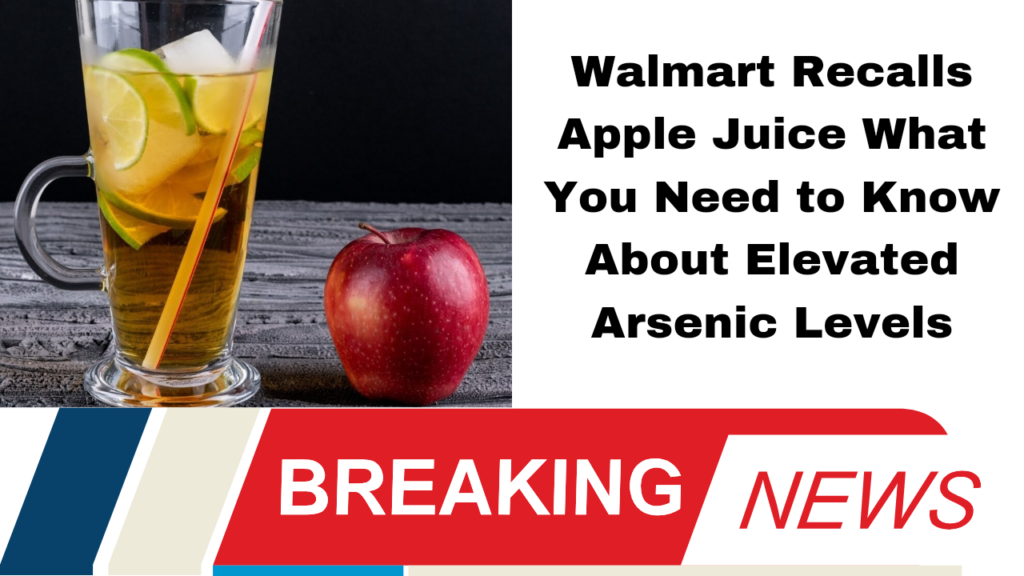Walmart has issued a recall for nearly 10,000 cases of Great Value eight-ounce apple juice, sold in six-packs, due to concerns over elevated levels of inorganic arsenic. This recall affects products with a “best if used by” date of December 28, 2024, and marked with the code CT89-6. This move follows an investigation by the U.S. Food and Drug Administration (FDA) that detected arsenic levels above the industry guidance action level.
The recall was first initiated by Refresco Beverages US Inc., based in Florida, on August 15, 2024. This decision came after the company was notified about the elevated levels of inorganic arsenic in the product. On August 23, 2024, the FDA upgraded the recall to a Class II status. This classification means that the use of or exposure to the product may cause temporary or medically reversible health consequences, but the probability of serious adverse health consequences is remote.

Distribution and Impact
The affected apple juice was distributed to Walmart stores across 30 states and regions in the United States, including:
– Alabama
– Connecticut
– Delaware
– Florida
– Georgia
– Illinois
– Indiana
– Kentucky
– Maine
– Maryland
– Massachusetts
– Michigan
– Mississippi
– New Hampshire
– New Jersey
– New York
– North Carolina
– Ohio
– Pennsylvania
– Puerto Rico
– Rhode Island
– South Carolina
– Tennessee
– Vermont
– Virginia
– Washington DC
– West Virginia
The apple juice in question was sold in PET plastic bottles in six-packs, identified by the UPC code 0-78742-29655-5. Consumers are advised to check their products against these details to determine if they are affected by the recall.
Health Risks Associated with Inorganic Arsenic
Inorganic arsenic is a known carcinogen, classified by the U.S. Environmental Protection Agency (EPA). It is significantly more toxic than organic arsenic, and exposure can have serious health implications. Short-term exposure to high levels of inorganic arsenic can lead to symptoms such as nausea, vomiting, bruising, and numbness or burning sensations in the extremities. Long-term exposure is associated with more severe health problems, including skin disorders, and an increased risk of developing skin, bladder, and lung cancers, as well as cardiovascular diseases.
Arsenic is a naturally occurring element found in soil, water, and rocks. It can enter the food supply during processing, particularly through the use of contaminated water or processing aids containing arsenic. The FDA has highlighted that inorganic arsenic poses greater health risks compared to organic arsenic, making it critical for manufacturers to ensure their products are free from such contamination.
Consumer Actions and Recommendations
Consumers who have purchased the affected apple juice are advised to immediately stop using the product. They should check for the “best if used by” date of December 28, 2024, and the code CT89-6. If their product matches these criteria, it should be either returned to Walmart for a full refund or disposed of properly. The FDA has not reported any injuries related to this recall, but it is essential for consumers to act swiftly to avoid potential health risks.
Walmart has been working closely with the FDA to manage the recall and ensure that all affected products are removed from shelves. The company has also been communicating with customers to provide information and assist with returns. For further assistance, consumers can contact Walmart’s customer service or visit the FDA’s website for updates and additional guidance.
Understanding Arsenic Contamination
Arsenic contamination in food products is a significant concern due to its toxic nature. The Centers for Disease Control and Prevention (CDC) explain that arsenic can enter the food supply through various means, including the use of contaminated water during processing or through the use of processing aids that contain arsenic. Inorganic arsenic, in particular, is more hazardous due to its higher toxicity levels.
The issue of arsenic in food products is not new. Regulatory agencies and manufacturers continually work to monitor and mitigate the risks associated with arsenic contamination. This recall highlights the importance of rigorous testing and quality control measures to ensure that food products are safe for consumption.
Regulatory and Industry Response
The FDA plays a crucial role in overseeing food safety and addressing contamination issues. In this case, the agency’s intervention led to the recall of the affected apple juice, demonstrating the importance of regulatory oversight in protecting public health. Refresco Beverages US Inc. has cooperated with the FDA throughout the investigation and recall process, reflecting the company’s commitment to consumer safety.
This recall also emphasizes the need for ongoing vigilance in the food industry. Manufacturers must implement stringent testing procedures and adhere to safety guidelines to prevent similar issues in the future. The collaboration between regulatory agencies and companies is essential in ensuring that food products meet safety standards and do not pose health risks to consumers.
Implications for Consumers and the Food Industry
For consumers, this recall serves as a reminder of the importance of being informed about the products they purchase and their potential risks. It also underscores the need for transparency and effective communication from retailers and manufacturers. By staying informed and taking appropriate action, consumers can better protect their health and well-being.
For the food industry, this incident highlights the ongoing challenges of maintaining food safety and managing contamination risks. The industry must continuously improve its practices and technologies to detect and address potential hazards. The recall process and regulatory response demonstrate the effectiveness of safety measures and the importance of consumer protection.
Walmart and the FDA are committed to addressing the recall effectively and ensuring that affected consumers are informed and safe. The recall serves as a reminder of the importance of vigilance in food safety and the role of regulatory agencies and companies in protecting public health.
Consumers are encouraged to stay informed and follow safety recommendations to ensure their well-being. For more information, Walmart’s customer service and the FDA’s website offer additional guidance and updates on the recall.
This recall underscores the ongoing efforts to maintain high standards in food safety and consumer protection, emphasizing the need for thorough testing, transparency, and collaboration in the food industry.











More Stories
Netanyahu Under Fire as Leaked Documents Scandal and Hostage Crisis Deepen
Mount Fuji’s Snowless Peak A Sign of Climate Change and Japan’s Cultural Icon in Crisis
Malik Mumbai’s 15 Crore Monthly Income ‘Haar Meri Jeet Apki Offer’ for WBBL 2024 Your Guaranteed Win or Refund!